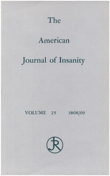Tryptophan depletion and attenuation of cue-induced craving for cocaine
Abstract
OBJECTIVE: Although cocaine is a potent serotonin (5-HT) reuptake blocker, the role of 5-HT systems in cocaine craving and relapse in humans has been unclear. The authors evaluated whether acute reductions in central 5-HT synthesis modulated craving for cocaine in cocaine- dependent patients. METHOD: Twenty-five cocaine-dependent male inpatients were exposed to cocaine-craving cues while their 5-HT levels were lowered and during a placebo condition in a counterbalanced, double-blind design. 5-HT levels were reduced by rapidly lowering plasma levels of its precursor, tryptophan; tryptophan levels were reduced by stimulating protein synthesis with a large drink of amino acids devoid of tryptophan. During the placebo condition the patients drank an identical amino acid drink containing tryptophan. Craving was induced by exposing patients to cocaine paraphernalia and a videotape depicting drug use. Craving was assessed 7 hours after ingestion of the drink. Visual analog ratings of craving for cocaine were administered before and after cue exposure at each test session. RESULTS: Patients reported less desire for cocaine stimulated by cue exposure after drinking amino acids without tryptophan than they did after drinking placebo. The order that tryptophan depletion and placebo tests were performed influenced the impact of tryptophan depletion on cue-induced craving. CONCLUSIONS: Serotonergic systems modulate cue-induced craving for cocaine, a factor implicated in relapse to cocaine use.
Access content
To read the fulltext, please use one of the options below to sign in or purchase access.- Personal login
- Institutional Login
- Sign in via OpenAthens
- Register for access
-
Please login/register if you wish to pair your device and check access availability.
Not a subscriber?
PsychiatryOnline subscription options offer access to the DSM-5 library, books, journals, CME, and patient resources. This all-in-one virtual library provides psychiatrists and mental health professionals with key resources for diagnosis, treatment, research, and professional development.
Need more help? PsychiatryOnline Customer Service may be reached by emailing [email protected] or by calling 800-368-5777 (in the U.S.) or 703-907-7322 (outside the U.S.).



